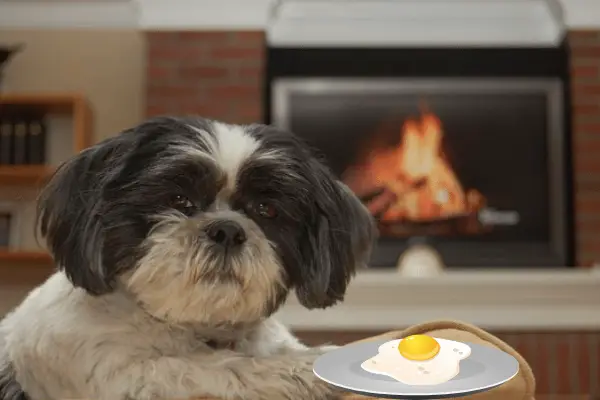Dog Guarding Food But Not Eating [9 Reasons & Tips]
![Dog Guarding Food But Not Eating [9 Reasons & Tips] Dog Guarding Food But Not Eating](https://petcreeks.com/wp-content/uploads/2023/04/Dog-Guarding-Food-But-Not-Eating.jpg)
Have you ever noticed your furry friend guarding their food but not actually eating it?
It’s not uncommon for dogs to exhibit this behavior, and it can be quite concerning for us humans.
In this short blog post, we’ll be discussing some possible reasons why your dog might be guarding their food and what you can do to address this behavior.
So, let’s dig in and help you understand your dog’s behavior better!
Why Is My Dog Guarding Food But Not Eating
Food guarding is a common behavior in dogs, and it can be caused by various factors such as fear, anxiety, or past experiences.
If your dog is guarding food but not eating, it could be a sign of stress or illness, and you should seek advice from a veterinarian or a professional dog trainer.
Resource guarding is a common behavior in dogs where they may protect their food, toys, or other prized possessions.
It is important to address this behavior promptly to prevent potential aggression and ensure your dog’s well-being.
Reasons For Dog Guarding Food But Not Eating
The following are some common reasons for dogs guarding food but not eating:
1. Fear of losing their food
Dogs who have previously had their food taken away may develop anxiety or dread related to doing so.
To stop someone from taking their meal, they can start to guard it.
Rescue dogs with a history of abuse or neglect may exhibit this behavior more frequently.
Building up your dog’s trust and confidence is essential if they are protecting their food out of fear.
Start providing them with food in a safe, calm area where they won’t be disturbed.
Introduce people or animals to the area gradually, rewarding your dog for being calm.
Instead of abruptly taking their food away from them, trade it for something useful instead, like a toy or reward.
2. Trauma or abuse
Dogs who have previously been subjected to trauma or cruelty may guard their food as a result of such experiences.
They might believe that in order to survive, they must safeguard their food.
It’s crucial to work with a competent dog trainer or behaviorist who has experience treating traumatized dogs because this type of behavior can be challenging to overcome.
3. Lack of trust
Dogs who are untrusting of their surroundings or the humans in them may defend their food.
This lack of trust may be the result of a prior unpleasant event, such as being mistreated or penalized while engaging in a meal.
It might also be a result of their environment changing or a lack of socializing.
Build your dog’s confidence and provide them with a secure, predictable environment if they are acting out because they don’t trust you, which may be the cause of their food-guarding behavior.
Maintain your regular schedule and stay away from abrupt changes.
Reward calm, easygoing behavior with positive reinforcement rather than reprimanding or punishing the offender.
4. Possessive behavior
Some dogs are naturally inclined to be territorial, especially with things they value highly.
This could apply to food, toys, or other items. Even when they are not hungry, they may get possessive of their food.
Dogs with poor socialization skills or those who have previously overindulged frequently exhibit this kind of behavior.
Possessive dogs need to learn that there are other valuable things in their surroundings except for their food.
Begin by training your dog to “drop it” when asked, then gradually add more toys and objects.
Reward them with positive reinforcement when they share or freely give something up.
5. Anxiety or stress
Dogs who are anxious or stressed out might guard their food as a coping tactic.
They could get defensive over their food because they believe it to be the only aspect of their surroundings they have control over.
Changes in habit, loud noises, or separation anxiety are just a few of the many causes of worry and stress.
It’s critical to determine and treat the root causes of any anxiety or stress that may be causing your dog to guard their food.
This could entail dealing with separation anxiety, fostering a peaceful atmosphere, or developing a training plan with the help of a qualified dog trainer or behaviorist.
6. Digestive issues
Dogs who are experiencing digestive problems, such as nausea or diarrhea, might not want to eat.
They may guard their food in some instances to keep others from consuming it.
Vomiting, stomach pain, and fatigue are some further indicators of digestive problems.
7. Dental problems
Dogs who have dental issues, such as gum disease or a broken tooth, may find it challenging to eat and may become food guardians as a result.
Bad breath, drooling, and unwillingness to chew are indications that you may have dental issues.
8. Resource guarding
Dogs naturally engage in resource guarding, so they can feel compelled to defend their food or other resources against fictitious dangers.
Numerous things, such as sensing threats from other animals or people in the house, can cause this behavior.
Growling, snarling, or biting when someone approaches their meal are symptoms of resource guarding.
9. Genetic predisposition
Akita and Shiba Inu dogs in particular are genetically susceptible to food-guarding behavior.
It’s possible for this conduct to be passed down through the generations.
Even while genetic predisposition cannot be changed, it is crucial to be aware of it if you are thinking about adopting one of these breeds.
If your dog has a hereditary propensity for food guarding, you should be aware of these characteristics and take precautions to stop the habit from emerging.
This may entail giving them food in a private, secure setting or giving them toys and other possessions they can guard without endangering themselves or others.
Learn more about how to comfort a sick dog.
How to Address Food Guarding Behavior in Dogs
Here are some common ways to address food-guarding behavior in dogs:
- Feeding the dog in a separate room: This can be helpful in minimizing the dog’s guarding behavior, especially if he gets aggressive around other dogs or people while eating.
- Teaching the “Drop it” command: This command can help dogs learn to give up their prized possessions, such as toys or food, without resorting to guarding behavior.
- Offering high-value treats: Providing a variety of treats can help the dog learn that relinquishing his food or toys is worth it, as he will receive something even better in return.
- Gradually increasing the dog’s comfort level: This involves slowly training the dog to accept a person being near his food or toys, starting with an increased distance and gradually moving closer.
- Using positive reinforcement: Rewarding the dog for good behavior can help him learn that he will be rewarded for relaxed behavior and is less likely to feel the need to guard.
- Changing feeding routines: Varying feeding times and locations can help the dog feel less territorial about his food.
- Using a specialized feeding system: A slow-feed bowl or puzzle toy can be used to make the dog eat his food more slowly and calmly, reducing the likelihood of guarding behavior.
- Avoiding punishment: Punishing the dog for food-guarding behavior can lead to an increase in aggression towards humans and other dogs. It is better to use positive reinforcement instead.
- Working with a professional trainer: A professional dog trainer can help assess the dog’s behavior and develop a customized training plan to address food-guarding behavior.
- Slowly desensitize your dog: Gradually desensitizing your dog to food-related triggers can help reduce food-guarding behavior. Start by feeding your dog in a separate room or area away from distractions, and gradually move the food closer to other people or pets over time.
Learn more about common dog sick symptoms you shouldn’t ignore.
Related questions
Why is my dog guarding their food but not eating?
There could be several reasons for this, including medical issues, anxiety, or guarding behavior.
How can I tell if my dog is guarding their food?
Signs of food-guarding behavior can include growling or snapping when approached while eating, stiff body language, or showing signs of stress around meal times.
What can I do to stop my dog from guarding its food?
It’s important to consult with a veterinarian or a professional dog behaviorist to address food-guarding behavior.
Management techniques may include feeding in a separate room or using a partition to prevent access to the food bowl.
Can certain types of food cause food-guarding behavior in dogs?
It’s possible that certain types of food or treats could trigger food-guarding behavior in dogs, or exacerbate existing behavior.
It’s important to consult with a veterinarian to rule out any underlying medical issues.
Should I punish my dog for food-guarding behavior?
Punishing a dog for food-guarding behavior is not recommended, as it can exacerbate the behavior and lead to more serious issues.
Instead, consider working with a professional dog behaviorist to address the underlying cause of the behavior.
Can food-guarding behavior be cured in dogs?
With proper management techniques and training, food-guarding behavior can be improved in dogs.
However, it’s important to remember that every dog is different and progress may vary. Consistency and patience are key when addressing this type of behavior.
Conclusion
In conclusion, it’s critical to recognize that if your dog is guarding their food but not eating, this behavior is normal and can be changed with time and patience.
You may make your pet feel more secure and at ease during mealtime by using the advice we’ve provided.
Always remember to be nice and compassionate, and if necessary, don’t be afraid to ask for a professional trainer’s assistance.
You may assist your dog in overcoming their food guarding tendency and regaining their enjoyment of meals with a little work and a lot of love.






![Can Beagles Eat Strawberries [How To Feed] Can Beagles Eat Strawberries](https://petcreeks.com/wp-content/uploads/2021/04/Can-Beagles-Eat-Strawberries.jpg)